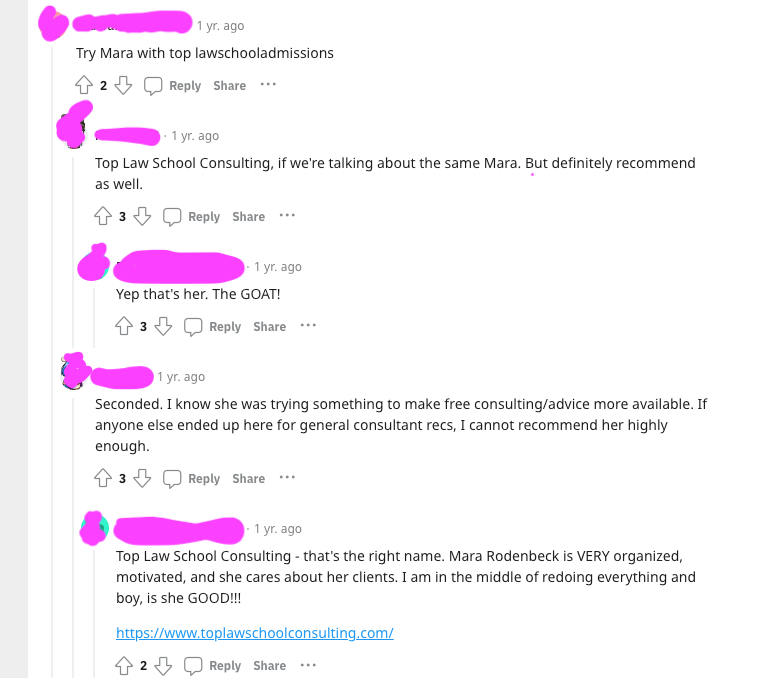The best law school admissions consultants don’t just help you get into law school. They help you get into your dream law school.
But here’s the truth: you don’t need a glorified essay editor.
You need a consultant who helps you uncover the story that sets you apart and shows admissions committees exactly why you should be admitted—even if your LSAT or GPA isn’t perfect.
And if they can also help you secure scholarships (which the best consultants often do), the investment practically pays for itself.
So how do you find that kind of consultant?
In this guide, I’ll walk you through exactly what to look for—and what to avoid—when choosing the right law school admissions consultant for you.
Why the right consultant makes all the difference
Applying to law school is one of the most competitive (and high-stakes!) processes you’ll ever go through. Top programs receive thousands of applications every year from students who all look strong on paper.
So how do admissions officers decide who gets in?
It often comes down to one thing: how well your story comes together.
That’s where the right consultant can completely change your results.
A great law school admissions consultant doesn’t just “fix” your essays.
They help you craft a cohesive narrative that shows exactly why you belong at your dream schools.
Take Lindsey, one of my former clients. Her LSAT and GPA were both below for her target schools. But she got accepted to all those schools and said:
“The Dean of the Law School told me that my personal statement was one of the strongest he’s read in a really really long time, and asked what he could do to make sure I was at the school next year.”
That’s the difference a great consultant can make. They’ll help you:
- Discover and communicate your strongest personal narrative
- Build a strategic plan for your entire application, including your personal statement, recommendation letter, and addenda
- Navigate the process efficiently so you don’t have to second-guess every decision
But first, you need to find that kind of consultant. Here’s exactly what to look for!

Step 1: Look for real experience and expertise
Before you commit to working with someone, take a close look at their background.
Ask yourself:
- How long have they been doing this work?
- What kinds of schools have their clients been admitted to?
- And just as importantly, how do they define success? By numbers, or by helping you find your best-fit program?
The best consultants have either worked inside admissions offices or have successfully navigated the journey themselves, getting admitted to top law schools and helping others do the same.
For example, I was admitted to the University of Pennsylvania Law School as a Toll Public Interest Scholar, which is one of the school’s most competitive, full-tuition awards.
After graduating, I built my career at a leading public interest law firm before discovering my true passion: helping law school applicants get into their dream schools and secure the scholarships that make it possible.
Since then, I’ve helped clients gain admission to top programs like Harvard, NYU, and Columbia. Collectively, they’ve earned millions of dollars in scholarships.
You can read more about my story here.
Step 2: Make sure their approach fits you
Every law school applicant has a different story, and the right consultant knows that from the very first conversation.
If a consultant jumps straight into edits or formulas without first getting to know you—your goals, your experiences, and why you want to study law—that’s a red flag.
You deserve someone who takes the time to understand who you are and what drives you. Because that’s what makes all the difference.
I can’t stress this enough.
Take Emily, one of my former clients. Her GPA was significantly below the median for every T-14 law school on her list. On paper, her chances didn’t look great. But we focused on what did make her stand out—her story.
By focusing on this piece, Emily was admitted to a T-10 law school, which, statistically speaking, “should” have been out of reach.
That’s the type of result you get from a personalized consulting approach.
So how do you find that kind of fit?

Do a first consultation
You’ll be spending weeks and months working together. Pay attention to how you feel during that first call. Do you feel seen? Encouraged? Understood?
Ask what’s included
Be clear about the scope of their support. Do they only help with your personal statement, or do they guide you through the full process (resume, addenda, recommendations, and scholarship strategy)? What’s their feedback process like? How often will you hear from them?
Do they “get” you?
A great consultant helps you uncover the thread that ties your entire story together so that your application feels cohesive and memorable. They’ll see your potential long before an admissions officer ever does. And they’ll push you, in the best way, to communicate that potential with confidence and authenticity.
The best part? Once you find that kind of consultant, the application process stops feeling overwhelming.
Step 3: Review their track record and reputation
When it comes to choosing a consultant, results matter. But what’s even more important is context.
Ask about the schools where their clients have been admitted, especially if those align with your own goals. A consultant who’s helped students get into schools like Harvard, NYU, or Georgetown has likely worked with a wide range of applicants.
But even more importantly: where did their clients start from? If you have a lower LSAT or GPA than the median of your top law schools, you should work with someone who has helped other clients with similar backgrounds.
At the same time, don’t just take their word for it.
Read reviews and testimonials
Go beyond their website and check what past clients are saying on Google, Reddit, or pre-law forums. Pay attention to how they describe the process: Was the consultant responsive? Honest? Supportive? Did they go above and beyond to help their clients feel confident at every stage?
Want an example? Here are some of my own reviews on:

Ask for references
Most consultants can connect you with past clients who can share their firsthand experience. Those conversations often give you the clearest sense of what it’s like to work together day-to-day.
And remember: don’t just look at the admit rate.
I’ve seen consultants throw around big percentages, but what truly matters is how they talk about their work. Do they explain their process? Give examples of different clients?
Step 4: Watch for red flags
Knowing what to avoid is just as important as knowing what to look for. So that you don’t make the wrong decision that could cost you several thousand dollars!
Here are a few signs to steer clear of:
- Unrealistic promises: If someone guarantees admission, that’s a red flag. No consultant can control committee decisions.
- “Insider connections” claims: Admissions decisions are made by committees and not by connections.
- Ethical shortcuts: Your consultant should never write essays for you, exaggerate your achievements, or encourage you to misrepresent your experience.
- Hidden fees or vague policies: You deserve full transparency from the start. Ask for clear pricing, timelines, and policies before signing on.
And if something feels off, trust that instinct. The right consultant will make you feel both excited and at ease about the process ahead.
Step 5: Compare before you hire anyone
Once you’ve done your research, take time to compare your options. Every consultant has a different style and finding the right match can make all the difference.
I always encourage students to speak with as many consultants as they need to before making a decision.
Here’s a quick checklist to guide you as you compare:
| Factor | Why it matters | What to look for |
|---|---|---|
| Experience | Proven success with similar applicants | Own experience applying to law school or former admissions experience |
| Personalization | Your story gets you admitted to law school | Tailored strategy and feedback (not minor grammatical edits) |
| Communication | You feel comfortable and supported | Clear, timely, and responsive communication |
| Reputation | You know you can trust their word | Verified testimonials and real success stories |
Finding the right law school admissions consultant will help the entire process feel less stressful and more exciting.
What should you ask a law school admissions consultant?
Before you commit to working with anyone, take time to ask the right questions.
Here are a few you can ask (and what to listen for in their answers):
1. “What’s your background in law school admissions?”
You want someone who truly understands the process, either because they’ve worked in admissions or have successfully applied to a top school.
2. “What’s your approach to working with clients?”
Listen for signs of personalization. Do they start by getting to know your story and goals? Or do they jump straight into templates and quick edits?
3. “What kind of results have your clients achieved?”
Ask for examples that align with your goals. A strong answer includes both admissions and scholarship wins.
4. “What does your package include?”
Make sure you understand what’s covered and how feedback is delivered.
5. “What can I expect from communication?”
You’ll want someone responsive and reliable. Ask about turnaround times, call availability, and how often you’ll check in.
6. “How do you handle feedback?”
A great consultant balances honesty with encouragement. You should feel supported and challenged.

Frequently asked questions: How to find a law school admissions consultant
What does a law school admissions consultant do?
A good consultant is your strategic partner throughout the entire process. They help you find the story that sets you apart and make sure every piece of your application, from your statement to your addenda, works together seamlessly.
How much does a consultant cost?
Most consultants charge between $200–$500 per hour or $3,000–$15,000+ for comprehensive packages, depending on their experience and level of support. It’s an investment, but for many students, the scholarship offers and school acceptances they earn more than make up for the cost.
Are consultants worth it?
If you want to save months of stress, avoid second-guessing every decision, and feel confident you’re submitting your strongest possible application, then, yes, a law school admissions consultant is worth it.
Want to get started now?
That’s it! Now you know how to find a law school admissions consultant who helps you create the best application possible.
I’ve watched applicants with less-than-perfect GPAs or LSATs turn their stories into acceptances at T-14 schools and scholarships they never thought possible. All because they learned how to communicate who they truly are.
And if you’re ready to see what that looks like for you, I’d love to help you craft the story that gets you into your dream law school—even if your scores aren’t perfect, your background isn’t traditional, or you’re not sure where to start.
Read more:





